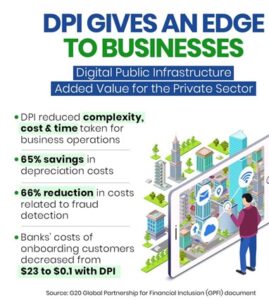G20 Sees Tech as Key to Inclusive Growth
Relevance
- GS 2: Bilateral, Regional, and Global Groupings and Agreements Involving India
- GS 3: Inclusive Growth, Science and Technology
- Tags: DigitalEcosystems #ArtificialIntelligence #Startup20 #FutureOfWork #SkillsDevelopment #InclusiveGrowth #DigitalTransformation #MintEditorial #UPSC
Why in the News?
In the recent G20 summit, India’s leadership in harnessing technology and digital infrastructure for inclusive growth was noteworthy. The summit addressed critical issues like digital public infrastructure, cybersecurity, AI ethics, and the future of work.
India’s Global Leadership at G20: A Historic Achievement
India’s active role in the G20 forum has elevated its global stature.
- The G20 Leaders’ Declaration, marked by unanimous agreement on all matters, stands as a historic accomplishment.
- In a world facing intricate challenges, India’s proactive stance positions it as a significant influence in shaping international discussions and actions.
India’s Technological Leadership in G20 Discussions
As G20 leaders engaged in discussions to address global challenges through human-centric approaches, the significance of technology in fostering inclusive, secure, and ethical growth became apparent. India, in particular, showcased its leadership in this domain.
- Over the past decade, India has consistently invested in and developed digital public infrastructure (DPI), a cornerstone for inclusive economic growth.
- Initiatives like BharatNet and Aadhaar, among others, have produced substantial, scalable impacts. India shared these insights with the G20.
The Leaders’ Declaration highlighted technology’s role in bridging digital gaps and advancing inclusive, sustainable development, it focused on-
Building Digital Public Infrastructure
- The G20 meeting emphasized the importance of developing strong, reliable, and inclusive Digital Public Infrastructure (DPI).
- This infrastructure should prioritize safety, security, trustworthiness, and accountability, while also upholding data privacy, intellectual property, and human rights.
- The G20 endorsed two significant initiatives: the voluntary G20 Framework for Digital Public Infrastructure Systems and India’s proposal to establish a Global Digital Public Infrastructure Repository.
- Additionally, they acknowledged the One Future Alliance initiative, designed to support low and middle-income countries in enhancing their DPI capabilities.
Ensuring Safety and Trust in the Digital Economy
- Leaders recognized the need to strengthen the digital economy with safety, security, and trust.
- They endorsed non-binding principles to assist businesses in achieving these goals.
- Toolkits were also highlighted, aimed at fostering cyber education and awareness among underage individuals.
Promoting Inclusive Digital Ecosystems
- The G20’s dedication to encouraging responsible, sustainable, and inclusive digital-tech implementation in sectors like agriculture, healthcare, and culture preservation was noteworthy.
- The Global Initiative on Digital Health, prioritizing data protection, plays a vital role in creating comprehensive ecosystems aligned with data protection regulations.
Responsible Harnessing of Artificial Intelligence (AI)
- Participants emphasized the need for AI systems that uphold transparency, fairness, accountability, and privacy.
- India’s advocacy for a comprehensive AI regulatory framework underlined that AI is more than a tool for progress; it’s a catalyst for human advancement, equity, and sustainability.
- Leaders’ commitment to G20 AI Principles, promoting a pro-innovation regulatory approach to leverage AI for Sustainable Development Goals, was commendable.
Startup and SMEs’ Vital Role in Economic Growth
- The G20 Declaration highlighted the vital role of startups and SMEs in driving sustainable economic growth and innovation.
- Under India’s Presidency, the G20 hosted its first Startup20 summit, uniting member countries to exchange best practices and harmonize approaches for cross-border ecosystem growth.
- India’s successful initiative has paved the path for an ongoing focus on startups and SMEs within the G20 framework, emphasizing their importance on the global economic stage.
Preparing for the Future of Work
- The G20 Leaders’ Declaration’s dedication to “Preparing for the Future of Work” is crucial.
- Addressing skill gaps, establishing well-managed migration pathways, and global skill gap assessment efforts are pressing needs on a global scale.
- This commitment aligns with the evolving dynamics of the workforce and is of paramount importance.
Enhancing International Workforce Collaboration
- The G20’s commitment to exploring an International reference classification system for skills and qualifications, along with a flexible toolkit for digital upskilling and reskilling programs.
- It highlights their recognition of the necessity to streamline cross-country resource utilization.
- This initiative simplifies resource-sharing among G20 members when the need arises.
Addressing Global Talent Crisis
- These initiatives, if pursued, can tackle the current global talent crisis and establish a unified framework for skill development, assessment, and mobility to meet the ever-growing demands of the digital era.
G20 leaders’ discussions highlight their dedication to utilizing technology and digital infrastructure for societal progress. This principle, fundamental in addressing challenges in a billion-plus population like India’s, is now a source of pride as many nations embrace a similar approach to unlock inclusive growth within their borders.
Source: Livemint
Mains Question
Discuss the role of artificial intelligence (AI) in achieving Sustainable Development Goals, as highlighted in the G20 Leaders’ Declaration. Analyze India’s stance on AI regulation and its alignment with the G20 AI Principles?





